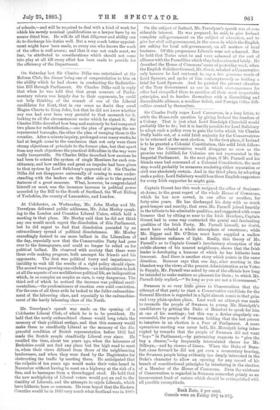On Saturday last Sir Charles Dilke was entertained at the
Reform Club, the dinner being one of congratulation to him on the ability which he had shown in conducting the Redistribu- tion Bill through Parliament. Sir Charles Dilke said in reply that when he was told that that great measure of Parlia- mentary reform was largely due to their opponents, he could not help thinking of the remark of one of the Liberal candidates for Kent, that in one sense no doubt they owed Magna Charta to King John, but that he did not know whether any one had ever been very grateful to that monarch for it, looking to all the circumstances under which he signed it. Sir Charles Dilke described how long and anxiously he had compared two plans for redistribution,—one the plan of grouping the un- represented boroughs, the other the plan of merging them in the counties. After a minute inquiry, prolonged over many weeks, he had at length come to the conclusion that not only were there strong objections of principle to the former plan, but that apart from any such objections the practical difficulties in the way were really insuperable. Sir Charles Dilke described how anxious he had been to extend the system of single Members for each con- stituency, and how sudden and great an impulse had been given to that system by Lord Salisbury's approval of it. Sir Charles Dilke did not disapprove universally of coming to some under- standing with the leaders on the other side as to the general features of a great measure. What, however, he congratulated himself on most, was the immense increase in political power accorded by the Bill to the South of Scotland, the West Riding of Yorkshire, the county of Lancashire, and London.


































 Previous page
Previous page